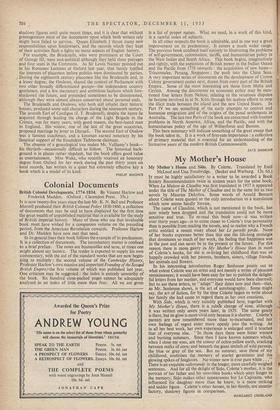Colonial Documents
British Colonial Developments, 1774-1834. By Vincent Harlow and Frederick Madden. (Oxford : Clarendon Press. 35s.) IT is now twenty-five years since the late Mr. K. N. Bell and Professor Morrell produced their British Colonial Policy 1830-1860, a collection of documents that may be said to have displayed for the first time the great wealth of unpublished material that is available for the study of British imperial history. Many of those who use that invaluable book must have wished for a companion volume on the preceding period, from the American Revolution onwards. Professor Harlow and Dr. Madden have now met that need.
In its general lines their book follows the example of its predecessor. It is a collection of docurhents. The introductory matter is confined to a brief preface. The notes are businesslike and terse, at times one might almost say laconic. The reader is expected to supply his own commentary, with the aid of the standard works that are now begin- ning to multiply : the second volume of the Cambridge History, Professor Harlow's own massive and important Founding of the Secaxd British Empire,• the first volume of which was published last year. One criticism may be suggested : the index is entirely unworthy of the book. Six hundred close-packed pages cannot be adequately analysed in an index of little more than four. All we are given is a list of proper names. What we need, in a work of this kind, is a careful index of subjects.
In all other respects the book is admirable, and in one way a great improvement on its predecessor. It covers a much wider range. The previous book confined itself entirely to illustrating the problems of self-government, colonisation, tariffs, and humanitarian policy in the West Indies and South Africa. This book begins, imaginatively and rightly, with the expansion of British power in the Indian Ocean and the Pacific from 1776 onwards : the acquisition of new bases— Trincomalee, Penang, Singapore ; the push into the China Seas. A very important series of documents on the development of Crown Colony government comes next, drawn from every part of the British Empire. Some of the most interesting are those from Malta and Ceylon. Among' the documents on economic policy may be men- tioned four letters from Nelson, relating to the vexatious disputes he became involved in at St. Kitts through his zealous efforts to stop the illicit trade between the island and the new United States. In Part IV we see something of the early attempts to control and humanise emigration and of the origins of the penal settlements in Australia. The last two Parts of the book are concerned with frontier problems in North America, Africa, and the Pacific, and with the humanitarian policy of the age of Wilberforce and Buxton. This bare summary will indicate something of the great sweep that the book takes in. It is a work of first-rate importance : a collection of primary material that is essential for an understanding of the formative years of the modern British Commonwealth.
JACK SIMMONS


































 Previous page
Previous page